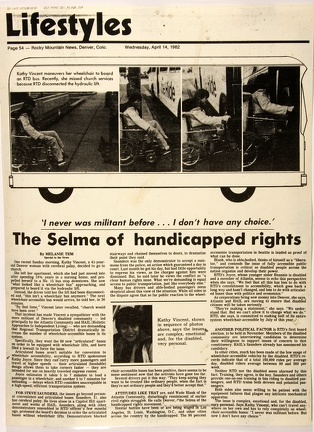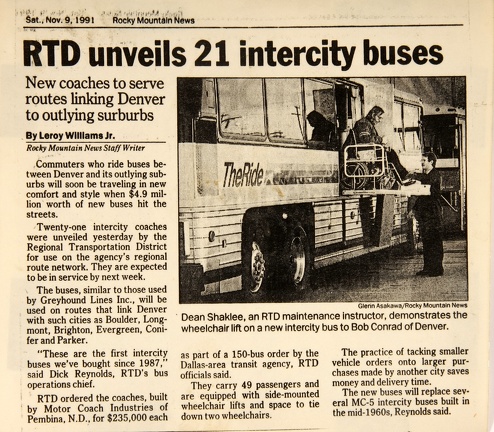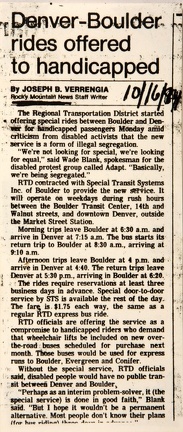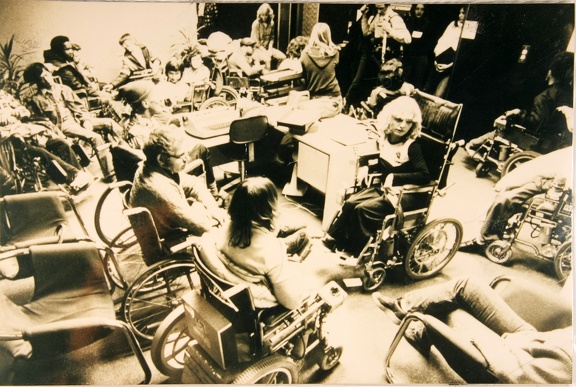- IdiomaAfrikaans Argentina AzÉrbaycanca
á¥áá áá£áá Äesky Ãslenska
áá¶áá¶ááááá à¤à¥à¤à¤à¤£à¥ বাà¦à¦²à¦¾
தமிழ௠à²à²¨à³à²¨à²¡ ภาษาà¹à¸à¸¢
ä¸æ (ç¹é«) ä¸æ (é¦æ¸¯) Bahasa Indonesia
Brasil Brezhoneg CatalÃ
ç®ä½ä¸æ Dansk Deutsch
Dhivehi English English
English Español Esperanto
Estonian Finnish Français
Français Gaeilge Galego
Hrvatski Italiano Îλληνικά
íêµì´ LatvieÅ¡u Lëtzebuergesch
Lietuviu Magyar Malay
Nederlands Norwegian nynorsk Norwegian
Polski Português RomânÄ
Slovenšcina Slovensky Srpski
Svenska Türkçe Tiếng Viá»t
Ù¾Ø§Ø±Ø³Û æ¥æ¬èª ÐÑлгаÑÑки
ÐакедонÑки Ðонгол Ð ÑÑÑкий
СÑпÑки УкÑаÑнÑÑка ×¢×ר×ת
اÙعربÙØ© اÙعربÙØ©
Inicio / Álbums / Denver RTD 65
Data do envío / 2016

 ADAPT (77)
ADAPT (77)
The Selma of handicapped rights By Melanie Tem One recent Sunday morning, Kathy Vincent, a 41-year-old Denver woman with cerebral palsy, decided to go to church. She left her apartment, which she had just moved into after spending years in a nursing home, and propelled herself to a No.15 bus stop downtown. She saw "what looked like a wheelchair bus" approaching, and prepared to board it via the hydraulic lift. Instead, the driver told her the lift had been disconnected and, "this isn't a wheelchair bus anymore." The next wheelchair-accessible bus would arrive, he told her, in 30 minutes. "By that time," Vincent later recalled, "church would have been over." That incident has made Vincent a sympathizer with the more militant of Denver's disabled community - led principally by the Atlantis Community and HAIL(Holistic Approaches to Independent Living) - who are demanding that Regional Transportation District dramatically increase the number of wheelchair-accessible buses in its system. Specifically, they want the 89 new "articulated" buses on order to be equipped with wheelchair lifts, and have filed a lawsuit to force the issue. Articulated buses aren't suitable for conversion to wheelchair accessibility, according to RTD spokesman Kathy Joyce. Since they can carry more passengers and travel at higher speeds - their articulated (bendable) design allows them to take corners faster - they are intended for use on heavily traveled express routes. Joyce estimates it takes 5 to 7 minutes to load a passenger in a wheelchair, and another 5 to 7 minutes for unloading - delays which RTD considers unacceptable in a high-speed, efficient transportation system. FOR STEVE SAUNDERS, the issues go beyond personal convenience and articulated buses. Saunders, 31, also has cerebral palsy. He lives alone in a Capitol Hill apartment and works at HAIL. Saunders, along with other demonstrators assembled in RTD offices a few months ago, protested the board's decision to order the articulated buses without wheelchair lifts. Demonstrators blocked stairways and chained themselves to doors, to dramatize their point they said. Saunders was the only demonstrator to accept a summons from the police, an action which guaranteed a day in court. Last month he got his day, but had little opportunity to express his views, as the charges against him were dismissed. But, he said later he views the conflict as “a clear human rights issue. What we're demanding is equal access to public transportation, just like everybody else." Many bus drivers and able-bodied passengers seem skeptical about this view of the situation. While all sides in the dispute agree that so far public reaction to the wheelchair-accessible buses has been positive, there seems to be some sentiment now that the activists have gone too far. Several drivers put it this way: "They keep saying they want to be treated like ordinary people, when the fact is they're not ordinary people and they'd better accept that." Attitudes like that are, said Wade Blank of the Atlantis Community, disturbingly reminiscent of earlier civil rights struggles. He calls Denver, "the Seima of the handicapped rights movement." Similar battles have been or are being waged in Los Angeles, St. Louis, Washington, D.C., and other cities across the country by the handicapped. The 90 percent accessible transportation in Seattle is lauded as proof of what can be done. Blank, who is able-bodied, thinks of himself as a "liberator," and contends the issue of full accessible public transportation is critical as disabled people across the nation organize and develop their power. RTD's Joyce, whose younger sister Heannie is disabled and a member of Atlantis, seems to echo this perspective when she says, "We feel that all this has less to do with RTD’s commitment to accessibility, which goes back a long way and hasn't changed, and less to do with articulated buses than with politics and economics." As corporations bring new money into Denver, she says, Atlantis and HAIL are moving to ensure that disabled citizens will be taken seriously. "They're making a statement," she says. "We understand that. But we can't allow it to change what we do." RTD, she says, is committed to making half of its entire system wheelchair-accessible by July of this year. ANOTHER POLITICAL FACTOR is RTD's first board election, to be held in November. Members of the disabled community are interviewing candidates to determine their willingness to support issues of concern to that constituency. HAlL's Saunders already has announced his candidacy. In other cities, much has been made of the low usage of wheelchair-accessible vehicles by the disabled. RTD's records indicate that of a total 160,000 rides per average day, disabled riders average between 90 and 260 per week. Neither RTD nor the disabled seem alarmed by this fact. Training, they agree, is the key. Saunders and others provide one-on-one training in bus riding to disabled passengers, and RTD trains both drivers and potential passengers. Both sides also seem willing to be patient with the equipment failures that plague any intricate mechanical apparatus. The issue ls complex, emotional and, for the disabled, very personal. Says Kathy Vincent, who can't travel anywhere on her own and has to rely completely on wheelchair-accessible buses: “l never was militant before. But now l don’t have any choice." ADAPT (142)
ADAPT (142)
Rocky Mountain News Sat., 11/9/91 PHOTO by Glenn Asakawa, Rocky Mountain News: A man in a wheelchair [Bob Conrad] sits on a lift in the raised position. A man in a dark suit stands beside the lift. The lift comes out of the center of the driver's side of the large over-the-road-bus. The bus fills most of the frame, and you can see another behind it. TheRide is printed on the side. Caption reads: Dean Shaklee, an RTD maintenance instructor, demonstrates the wheelchair lift on a new intercity bus to Bob Conrad of Denver. RTD unveils 21 intercity buses New coaches to serve routes linking Denver to outlying suburbs By Leroy Williams Jr., Rocky Mountain News Staff Writer Commuters who ride buses between Denver and its outlying suburbs will soon be traveling in new comfort and style when $4.9 million worth of new buses hit the streets. Twenty-one intercity coaches were unveiled yesterday by the Regional Transportation District for use on the agency’s regional route network. They are expected to be in service by next week. The buses, similar to those used by Greyhound Lines Inc., will be used on routes that link Denver with such cities as Boulder, Longmont, Brighton, Evergreen, Conifer and Parker. “These are the first intercity buses we’ve bought since 1987,” said Dick Reynolds, RTD’s bus operation chief. RTD ordered the coaches, built by Motor Coach Industries of Pembina, N.D., for $235,000 each as part of a 150-bus order by the Dallas-area transit agency, RTD officials said. They carry 49 passengers and are equipped with side-mounted wheelchair lifts and space to tie down two wheelchairs. The practice of tacking smaller vehicle orders onto larger purchases made by another city saves money and delivery time. The new buses will replace several MC-5 intercity buses built in the mid-1960s, Reynolds said.![ADAPT (141) (3056 visits) Denver Post 2/16/85
PHOTO by Denver Post's Jim Pre[name cut off]: A uniformed policeman kn... ADAPT (141)](_data/i/upload/2016/05/10/20160510141018-7663317b-sm.jpg) ADAPT (141)
ADAPT (141)
Denver Post 2/16/85 PHOTO by Denver Post's Jim Pre[name cut off]: A uniformed policeman kneels beside a man in a wheelchair [George Roberts]. George has shades and an Afro and he is tilting his head to the side toward the policeman. The policeman is writing a ticket on his knee and George is telling him his information. Behind the two of them is another uniformed officer, visor on his cap shading his eyes, arms crossed across his chest and disapproving turn to his mouth. Behind him is a blurry crowd of people with their backs toward the camera. Caption reads: Officer R.H. Kaspersen issues a ticket to George Roberts during blockade of metro buses. Handicapped block buses 2 protesters are arrested; talks planned By Judith Brimberg 2/16/85 Denver Post Staff Writer For the second day in a row, wheelchair-bound protesters blocked an RTD bus in downtown Denver Friday. They were demonstrating against possible discontinuation of accessible bus service for the handicapped. Despite efforts by the Peña administration to mediate the dispute, the protest went off as scheduled, and two handicapped demonstrators were arrested. Denver police identified them as George Roberts, 36, and Renate Rabe, 30, who live in the same apartment complex at 1255 Galapago St. The pair, afflicted with cerebral palsy, were charged with impeding traffic and disobeying a lawful order. Rabe was released on her own recognizance, but Roberts, who participated in a similar demonstration several years ago, was held overnight in Denver County Jail. Thursday, another member of the disabled-rights group known as ADAPT, Mike Auberger, 30, was arrested at East Colfax Avenue and Cherry Street for impeding traffic. But efforts by Dale Saddler of the Mayor’s Commission on the Disabled ultimately paid off. Late Friday, both sides agreed to meet early next week to try to resolve the dispute. Demonstrations scheduled for this weekend were called off. The handicapped community contended that RTD failed to understand that separate, private transportation for the handicapped doesn’t meet everyone’s needs, said Wade Blank, an able-bodied demonstrator who organized the protests. On Tuesday, an RTD committee is to review policies affecting the elderly and the handicapped. Among the options to be considered are discontinuing accessible service on public buses and expanding handyride services or brokering services to private providers. In an interview, Blank said he organized the protests because “the handicapped aren’t going to be the stepping stones to a new budget.” More than two years ago, he and others obtained a commitment from RTD to install wheelchair lifts on 50 percent of the peak-hour buses. But RTD, like other transportation districts across the country, is facing severe cuts in federal aid and Blank fears the agency may try to balance its budget at the expense of the handicapped. Many wheelchair lifts have proved unreliable and costly to repair. Larry Perry, chairman pro tem of the RTD board, said Friday that Blank’s fears were groundless. “If they will sit down and talk with us, they will learn they won’t be hurt,” he declared. Earlier this week, however, General Manager Ed Colby told board members it costs $72 a year to maintain bus lifts because 12,000 disabled persons ride the buses each year. It’s cheaper to maintain lifts on the handy vans, Colby said. Blank countered that RTD is sabotaging its accessible program by refusing to perform inventive maintenance on the Colby’s handyride figures are distorted, he added, because they include the elderly as well as the disabled. ADAPT (140)
ADAPT (140)
Rocky Mountain News 10/16/84 Denver- Boulder rides offered to handicapped By JOSEPH B. VERRENGIA Rocky Mountain News Staff Writer The Regional Transportation District started offering special rides between Boulder and Denver for handicapped passengers Monday amid criticism from disabled activist that the new service is a form of illegal segregation. “We’re not looking for special, we’re looking for equal,” said Wade Blank, spokesman for the disabled protect group called Adapt. “Basically, we’re being segregated.” RTD contracted with Special Transit Systems Inc. of Boulder to provide the new service. It will operate on weekdays during rush hours between the Boulder Transit Center, 14th and Walnut streets, and down town Denver, outside the Market Street Station. Morning Trips leave Boulder at 6:30 a.m. and arrive in Denver at 7:15 a.m. The bus starts its return trip to Boulder at 8:30 a.m., arriving at 9:10 a.m. Afternoon trips leave Boulder at 4 p.m. and arrive in Denver at 4:40. The return trips leave Denver at 5:30 p.m., arriving in Boulder at 6:20. The rides require reservations at least three business days in advance. Special door-to-door service by STS is available the rest of the day. The fare is $1.75 each way, the same as a regular RTD express bus ride. RTD officials are offering the service as a compromise to handicapped riders who demand that wheelchair lifts be included on new over-the-road buses scheduled for purchase next month. Those buses would be used for express runs to Boulder, Evergreen and Conifer. Without the special service, RTD officials said, disabled people would have no public transit between Denver and Boulder. “Perhaps as an interim problem-solver, it (the special service) is done in good faith,” Blank said. “But I hope it wouldn’t be a permanent alternative. Most people don’t know their plans (for bus riding) three days in advance." ADAPT (139)
ADAPT (139)
PHOTO: A group of about 20 people in wheelchairs and a couple of folks not in wheelchairs sit in a circle facing mostly toward the center. In the middle of the room, at the center of the people is an unattended L-shaped desk with a typewriter and other materials on it. Two people in wheelchairs sit at either end. Others are mostly up against the walls forming an informal circle. The group appears to be occupying a lobby-reception area.